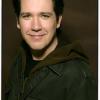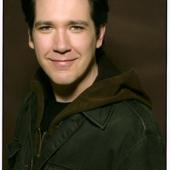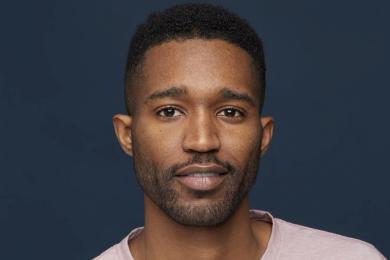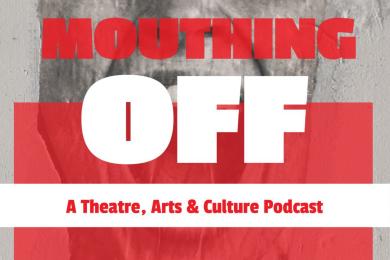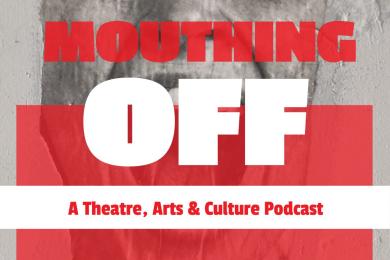Playlist profile: Sarah Bellamy
Interview
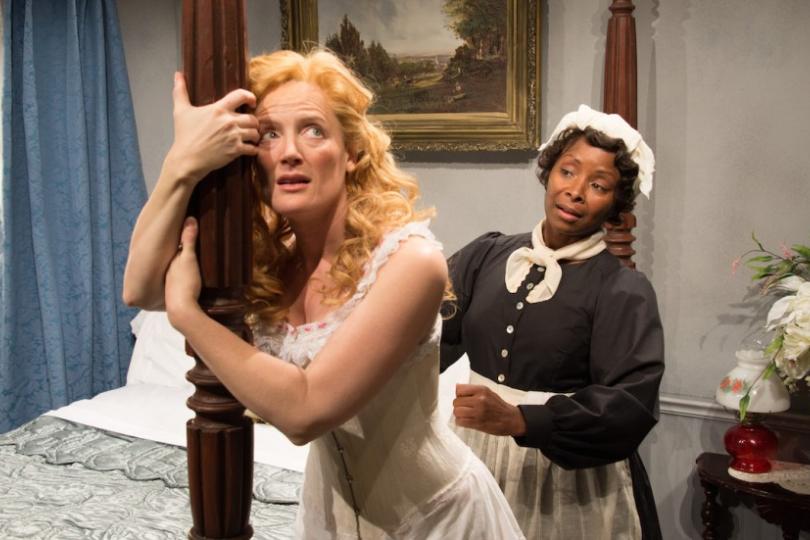
Sarah Bellamy comes from Twin Cities theater royalty. She has been working her way through the ranks and now sits atop the ladder at the nation’s pre-eminent theater dedicated to the African- American experience. Though many are familiar with her name, I, for one, was less knowledgeable about her work and her journey to her current position.
I sat with Sarah in her office at Penumbra and listened as this soft-spoken woman shared parts of her history and her ideas for where she and the theater that she grew up in are heading. It promises to be a journey worth of keen attention.
How long have you been in your current position here and how’s it going?
I have been Co-Artistic Director of Penumbra since January 2013, and it’s been going really well. There’s a lot of rapid change. My father and I have had the chance to work together for 9 years, but in this capacity, we’re really working together as partners. And it’s really fun to work beside him. He’s been in the business a long time, so he’s got a lot of knowledge about things like strategy and helping me avoid certain pitfalls. He’s also still got a really wonderful sense of humor! Which is important. So we have a lot of fun.
We’re in the process now of building out my vision for the future of the theater. Which is wild. You know, it’s like, “You dreamed this up and now it’s going to happen, and these people are going to help you.” And it’s like, What?! I feel incredibly grateful and a little nervous but also enthusiastic and really hopeful about it. What we’re imagining is a model that doesn’t exist in theater today. But my sense, and I’m somebody who really trusts my intuition, my sense is that it’s where we’re going. Theaters need to go to be of service to the communities in which they’re housed.
As Penumbra undergoes a generational handoff into your Artistic Directorship, what things are you most interested in holding onto from the theater’s past, and what dreams or visions are you interested in pursuing that might be a departure?
I think that’s an essential question that a lot of us are asking, and certainly I rely on and am replenished by conversations with colleagues that are entering into similar positions, like Randy Reyes. Joel Sass and I have talked about it.
One of the things that I have seen field wide, and it’s an unfortunate thing that I’m sad to see, is that there are people who are more focused on ego and what they can build rather than what already exists and how it’s served. And so a lot of what I’ve seen is an impulse to burn the fields, and say let’s throw it all out, get rid of it. I don’t know if it’s part of being an African-American person and the history and culture and understanding that we build toward social justice and equity, that this movement has been going on for hundreds of years, and that as August Wilson says, you walk in your grandfather’s shoes and stand on the shoulders of giants. So I’m not interested in burning the field, I have no ego about that.
What I am interested in is going back to the mission of Penumbra and making it live as vibrantly as possible. So when Penumbra was founded in 1976, a black theater company in the Twin Cities, what they were mostly fighting for was just to be recognized as full human beings with breadth and depth and diversity within the community. And to offer African-American artists the opportunity to be three-dimensional people onstage. As opposed to the stereotypical roles they were getting, if the were getting anything at all, at other theater companies.
So that was a big tall order and they fought hard to establish themselves, to train critics to understand what this was, all of that. There was always a social justice implication there, but it had to be kind of hidden. Because it was such a radical thing that black folks were onstage talking about issues. God forbid we also take up equity! But it was in there, and they found clandestine ways to engage the community in that kind of conversation.
And then as time went on it became more and more obvious that that was part of the mission of Penumbra. So now I really want to put our social justice and advocacy efforts front and center, and say that we’re a company that’s about equity, it’s a core value, and what does that look like. What does that mean with regard to the art that we produce, partnerships we enter into, how those partnerships are constructed, all of that. How do we engage our community members and the people who love and trust Penumbra in efforts to better our communities? I’m excited about that.
What I want to maintain: the bricks and mortar of our space in this community, I’d love to see Penumbra stay in the Martin Luther King/Hallie Q. Brown Center; we’ll always do classical black drama, but I would like to see us commission more so we can guide the conversations people have; I want to always have a company of actors that orbit the theater who are down for us and will come back and be here, and I also want to bring new voices up. We have to train that next generation, because frankly, even though they don’t like to think about it, our company is aging, so if no one has been on the boards with them and knows what it’s like to be in a Penumbra production and how it’s a little different and what that aesthetic means, then we’re in trouble.
What is your history as an artist?
I think artists are the most brave people ever, and for a long time I wasn’t willing to be quite as brave. I felt there was more security in the academy, so I spent a lot of time chasing degrees. But my biggest passion, since I was a small girl has always been writing. I love writing, I think I’m a good writer, so I went to college to study creative writing. Once there I studied post-colonial theory and literature and film, so I got a little side tracked. I also enjoy directing. Acting is not for me. I loved it when I had an opportunity to do it as a young girl, but it’s a courage I don’t have. I am in awe of actors, and I’m more comfortable behind the scenes.
So those are my creative passions. In addition to which I love to garden, I love to cook. My creativity comes out in lots of different ways.
In the past most artistic directors have been white men who direct. With you taking this position, I wonder if there is room for AD’s who aren’t primarily identified as artists (not saying that’s you necessarily), and what they might bring to the table that hasn’t been there before.
Somebody posed a question to me today that I thought was really fascinating. We weren’t talking about an artistic directorship, but the question was, Do you need to be a leader who can do, or do you need to recognize we don’t do this best so who do we need to get? And I’m really comfortable with a collaborative work environment and bringing on experts. I love having people around me who don’t do what I do and bring a different lens to the process. I think growing up in the theater and seeing how the ensemble worked really influenced that. So, here’s what I know about myself: I have a keen eye for art, that theater is in my bones, that I get story, that I get the beats, I know how to track that, I can translate that story to an audience and keep them engaged. Have I studied it, have I taken classes? Here and there. But I was never going to get an MFA in directing. That wasn’t because I didn’t take the art seriously, it was because I knew it was there and I wasn’t sure it was the path.
I see myself committing to Penumbra because I want to make sure that this theater company stays vital, that it continues on the course of its mission and that it’s sustainable into the future, that it’s here for young artists coming up. And I believe I have an inner compass that knows this company and knows its mission and core values and I trust that I can lead that and steer that.
Right now my role as Artistic Director is about building an infrastructure for a new organization. That’s not a traditional role of an artistic director, it’s something a Managing Director would do. I think I’ll function differently as an Artistic Director, but I will set the tone for the theater, I’ll select the season, select the content, and then I’ll find the best people to make the projects happen, whether that’s me or someone else.
What’s your first memory of seeing a live performance?
It was probably here at Penumbra. I’m sure. For some reason what’s coming to mind is a play about soldiers. I don’t even know what play it was. Men walking around onstage being very loud. And it being dramatic and loud and scary and exciting. My heart beating fast. Then I have memories of Black Nativity and the music. Of course I have visceral memories of being in the plays.
And then there’s another really profound memory of going on a school field trip to see The Cherry Orchard at the Guthrie under Garland Wright. They had a tree that came out on stage, and then it blossomed! There were no blossoms, and then there were blossoms there! And it was like, what?! How do you do that?! That’s amazing!
What were those early, visceral memories of being in a play?
It’s so funny that you’re asking this because I was thinking about it this morning. I was thinking about the production of Joe Turner’s Come and Gone that we did at 7th Place Theater. My dad was in it and I was in it and Jim Craven was in it and Tonya Jackson was in it, Deidre Whitlock. My uncle Terry was in it. I remember feeling very privileged to be in the women’s dressing room with all of these ladies who were getting prepared. Tonya is brilliant. She was a young actress at that time, very supple and confident. I just remember thinking I will never be that confident. Ever! And she would crack jokes, her energy was just like an electric wire. She was alive in that dressing room and she would laugh and it would fill the room up.
I remember women braiding my hair for the show. I remember having to kiss a boy for a scene. Mary Winchell was the stage manager and I started crying, because I didn’t want to kiss him in front of my dad, or at all! The boy was played by Andre Samples, sweet man, right, today we’re fine, but then I thought I can’t do this and I can’t do this in front of my dad. So Mary kicked my dad out.
I remember the warmth of Jim Craven’s hand onstage. I remember the brush of costumes against my face when people would hug me.
And in Fences I remember looking out at the audience, and every night like clockwork, on the same line there was this white movement in the audience. And I thought, what is that? They were Kleenex. On the same line, every night! And I remember thinking, that’s power. I want to do that.
August Wilson, who would come back periodically, was so patient with me. He would take my hand, he was like a giant to me, though he wasn’t a big man. He said, you keep writing. Keep writing. If you ever want me to read some of your pages, send them to me. I had no idea what was being offered. I never took him up on it, because I was too chicken. But those were the kinds of nurturing people I was around. They took the art very, very seriously, but they had a lot of fun.
When did you decide to make theater your career?
I don’t know that I did. It might have just happened. I remember my dad talking to me in my 20’s and him saying, do you think you want to stay here, do you think you’d want to take over? And I had no idea, I was in my 20’s. Then later I said, maybe I will and he said, please don’t. Please go be a lawyer or a doctor. Non-profit art administration is not for the faint of heart.
It wasn’t until I started to see the success of the programs I built in the education department, how that was starting to bring in new revenue for the company, and how I started engaging more in the politics of the field, that I really said, you know what, this is something I can see myself doing.
One of my most passionate commitments right now is to the Theater Communications Group board, serving as the chair of the Equity, Diversity and Inclusion committee, because I see the potential for field-wide sweeping change, for inclusion, for making room for new voices. So in some ways, everything I’ve studied is relevant and necessary and vital to the space that I can occupy within the field. And that feels really cool, because at first I was like, why am I taking this anthropology class, how is this ever going to be relevant? So to see things come together and to find the confluence organically is so heartening.
What does your dream career look like?
For a long time my super-secret-wouldn’t-tell-anybody dream career was to be a film director. But I was way too chicken. And that also wasn’t a space that many women were occupying. But today, honestly, to be able to do what I do here? This is pretty awesome.
The only other thing I could imagine I would add to it is if I was literally saving lives! That would be really cool. But I like to think we’re psychicly repairing people.
My impression of Penumbra has always been that it is a nationally important theater of great integrity that focuses on the African American experience and that it was also a very masculine place. In calling this new season Womansong and having you, a younger woman, at the top of the ladder now, is that reputation or impression something you’re reacting to?
My father always made it clear that I could be anything I wanted to be, but that whatever I took on, I had to be better at it. That I got being both black and being a woman, you’ve just got to be twice as good. Ok, no pressure!
There was a kind of repair that needed to be done to address the assault on black masculinity by the larger society. Both coming off the heels of the black power movement in the 60’s and 70’s, but also historically, since black people were brought here. Black men have been consistently stalked, attacked, lynched, brutalized. Look at the news today. So I think it was vitally important that the founding company members addressed that current of violence in our American history and also really gave voice to black men and their potential. That needed to happen.
I think whether that happened at the expense of black women also being given space to do that same work is a vital question to ask. I think in the early years, just like in the black power movement, black women weren’t seen at the fore of it, but two thirds of the black power movement when it began were women. The women who were involved in this company, I’m thinking of Faye Price who goes on to lead Pillsbury House Theatre, were vital, but they weren’t front and center. That’s a problem.
I think it’s important that people understand that Penumbra has produced more work by black women than any other company in the Twin Cities and most in the country. A lot of that work has been brand new; they’ve never had a stage for it before, and they found that here. We’ve had different seasons here, not in the sense of a year of plays, but in the larger sense. When Rebecca Rice was here, the kind of work we were doing, her Waiting in Vain – she was a wonderful woman, a special person. When Laurie Carlos was here a different kind of aesthetic and work started cropping up.
So Lou has made space for it but going forward I think there will be more intention about it.


